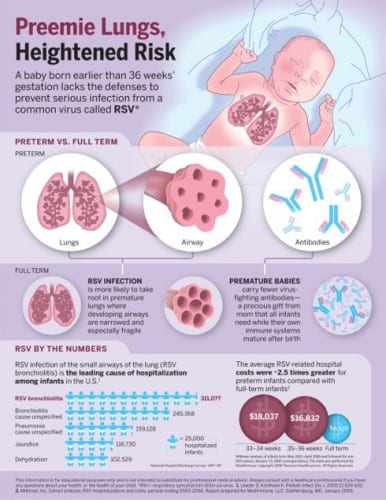November 17th is World Preemie Awareness Day. I had no idea that there was a significant date dedicated to educating the world about premature babies, and, sadly, I missed it this year. That doesn’t mean that I can’t share some important information with all of you parents and parents-to-be!
In the US alone, more than 500,000 babies are born prematurely every year. I think almost every mom-to-be is aware of preterm labor, but, according to The March of Dimes, most parents aren’t properly educated about the additional medical care that preterm babies require:
At birth, preemies often have difficulty with breathing, feeding and maintaining temperature. Because their immune systems haven’t had time to fully mature, preterm infants are more likely to develop infections, and because their lungs are underdeveloped, they are more susceptible to respiratory problems.
For example, I’ve known three full-term infants who have contracted RSV (respiratory syncytial virus) in the first few months of their lives. Two of those babies were hospitalized for three days in order to be carefully monitored and treated. The third was cared for at home. I actually just learned that almost every child contracts RSV before the age of two, but symptoms are so similar to the common cold for many otherwise-healthy little ones that parents may not even know that their child has the virus.
RSV is a much scarier condition in preterm babies. Because they because they don’t have the antibodies needed to fight off infection, all preterm infants are at increased risk for developing an RSV-related infection, often requiring medical attention or hospitalization.
RSV generally occurs in epidemics in a CDC-defined “RSV Season.” This season beings in November and lasts through March in most parts of the United States. (It should be noted, however, that certain regions have a much longer season that beings in July and ends in April).
How we can Prevent RSV?
There is no treatment for RSV, so it’s important for parents to take the following preventive steps to help protect their child:
- Frequently wash hands, toys, bedding, play areas and other playthings.
- Wash your own hands, have your family members wash their hands and ensure that anyone who enters your home washes their hands or uses hand sanitizer.
- Avoid large crowds and people who may be sick
- Never expose your baby to secondhand smoke or let anyone smoke near your baby.
- Speak with your child’s doctor if you believe he or she may be at high risk for RSV.
What are the Symptoms of RSV?
Contact your child’s pediatrician immediately if your child exhibits one or more of the following:
- Persistent coughing or wheezing
- Rapid, difficult, or gasping breaths
- Blue color on the lips, mouth, or under the fingernails
- High fever
- Extreme fatigue
- Difficulty feeding
To learn more about RSV, visit www.rsvprotection.com. For more about the specialized health needs of preterm infants, visit www.preemievoices.com.
The graphic below provides an easy-to-understand picture of how RSV is different in pre-term babies:
I wrote this review while participating in a blog tour by Mom Central Consulting on behalf of MedImmune and received a promotional item to thank me for taking the time to participate.


Leave a Reply